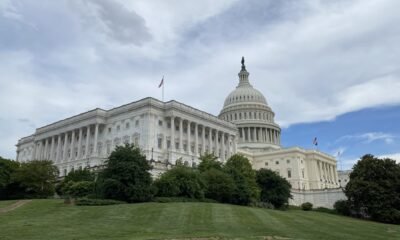2024 election
Democratic Rising Star Takes on Seasoned GOP Senator in Crucial Chandler District

In a pivotal electoral contest for the Arizona Senate, a Democratic challenger is confronting a seasoned Republican lawmaker. This race is poised to influence the balance of power within the state’s legislature.
J.D. Mesnard, a Republican from Chandler, has a lengthy political history. First elected to the Arizona House in 2010, he went on to serve as speaker and has been in the Senate since 2018. His background also includes eight years as a policy advisor and two decades as a political science professor at prominent local institutions.
Mesnard played a key role in establishing Arizona’s flat personal income tax rate, which took effect in January 2023. He has also been involved with lobbying for the Alliance Defending Freedom, known for its controversial stances on LGBTQ rights and abortion.
His opponent, Sharon Winters, is a former special education teacher and children’s author. A political newcomer, she emphasizes reproductive rights and seeks increased funding for public schools as core issues of her campaign.
Legislative District 13, comprising parts of Chandler, Gilbert, and Sun Lakes, traditionally leans Republican. However, recent changes in legislative maps have categorized it as a highly competitive district, particularly after Democrats secured one of its two House seats in 2022.
For decades, Republicans have dominated Arizona’s state legislature, maintaining control of the House since 1966. Democrats are now aiming to flip both chambers, an effort bolstered by the election of Governor Katie Hobbs.
Winters expressed optimism about the Democrats’ chances, suggesting a balanced likelihood of success. On the other hand, Mesnard acknowledges the competitive nature of the race while remaining cautiously hopeful, despite concerns about potential funding disparities.
Raising nearly $108,000, Mesnard currently outpaces Winters, who has secured around $59,000. He claims that Democrats have successfully diverted attention from major voter concerns, such as the economy and public safety.
On the issue of reproductive rights, Winters advocates for comprehensive access while criticizing existing restrictions. In contrast, Mesnard supports Arizona’s current 15-week abortion ban but has indicated a willingness to consider exceptions for rape and incest.
Mesnard’s past votes reflect his strong anti-abortion stance, including opposition to repealing a historic near-total abortion ban. Winters champions the Arizona Abortion Access Act and believes in constitutional protections for abortion rights.
While Mesnard asserts that his party’s focus on economic improvement resonates more with voters, he has also taken pride in past tax reforms. Critics, however, argue that such tax cuts have disproportionately benefited higher-income individuals.
Education represents another critical point of contention. Winters calls for attention to the state’s public education challenges, citing a lack of certified teachers, particularly in special education and STEM fields. She attributes this predicament to inadequate compensation.
Winters proposes adjustments to Arizona’s universal school voucher program, expressing concern that it diverts essential funding from public schools. She contends that the expansion of vouchers favors wealthier families, while Mesnard defends the program as enhancing parental choice.
The dynamics of this electoral battle reflect broader national conversations about reproductive rights, economic policy, and educational reform in Arizona, underscoring the potential for significant shifts in legislative governance.


















